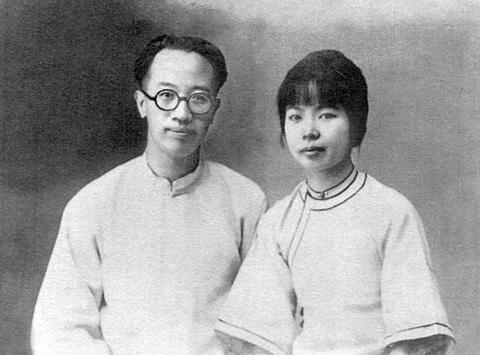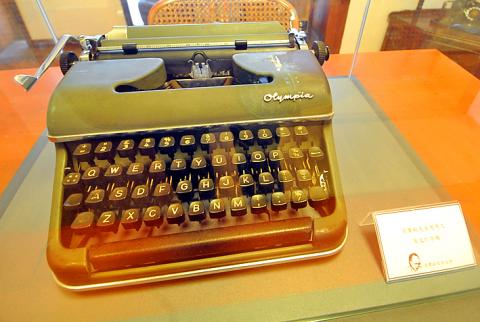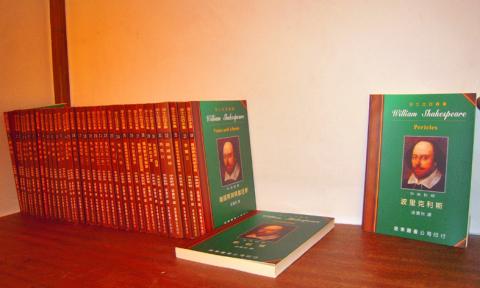Taiwan in Time: Nov. 2 to Nov. 8
Upon the mention of Shakespeare during an interview in 1987, an 84-year-old Liang Shih-chiu (梁實秋) exclaimed, “Shakespeare again! I’ve already declared that I’ve severed all relations with him.”
But the Chinese-born writer and longtime National Taiwan Normal University (國立師範大學) English professor seemed eager to discuss what he called the “most important task in his life” — translating into Chinese the entire works of the legendary playwright and poet.

Courtesy of Wikipedia Commons
Liang died on Nov. 3 in Taipei, just a few months after that interview.
When the project was conceived in 1930, Liang was a young scholar who had recently returned to China after studying literature at Harvard and Columbia universities. It was 1967 when he singlehandedly completed the momentous task, and by that time he was a retired professor living in Taiwan.
The finished product contained 40 volumes (37 plays and three poem collections) and more than four million words. During the celebratory feast, Liang listed three key traits a person would need to accomplish what he did.

Photo: Wang Min-wei, Taipei Times
“Firstly, he can’t be too academically inclined, because if so, he would be doing research instead. Secondly, he can’t be a genius, because if so, he would be creating his own works instead. Thirdly, he must be long-living. I’m lucky that I possess all three traits,” he is reported to have said.
It wasn’t supposed to take this long. Philosopher and writer Hu Shih (胡適), then on the translation committee of the China Foundation for the Promotion of Education Culture (中華文化教育基金會), had planned for it to be a group project between five scholars, to be completed in five years.
Liang wrote that the other four dropped out for various reasons, and he carried on alone. However, war soon broke out in China with the Japanese invasion and later the Chinese Civil War. The majority of the translation was done in Taiwan, to where Liang had retreated with the Chinese Nationalist Party in 1949.

Photo: Hu Ching-hui, Taipei Times
Liang already had a few English-language book translations — Peter Pan and Silas Marner — under his belt when Hu recruited him.
Born in Beijing in 1903, Liang attended Tsinghua School (清華學校), which back then was a western-style prep school for students to study abroad in the US. In 1923, the entire class headed to the US, where Liang would spend time at Colorado College, Harvard and Columbia University. However, he was just as passionate about Chinese literature as he was Western.
He was very particular about his translation work, stating that his primary concern was to stay true to the original meaning of the text instead of translating directly. The main difference is that Liang’s translation is meant to be read, while Shakespeare’s works are meant to be acted out on a stage.
“Although I can’t translate word for word, at least I tried to do it sentence by sentence,” he said. “I will absolutely not delete anything, unlike some people today. I even tried to keep Shakespeare’s punctuation.”
It’s often mentioned how Liang also kept all obscene language or sexual references, which was not commonplace in those times.
“Sex is something that everyone is interested in, even in Chinese theater,” he said.
He also mentions the difficulty of translating puns.
“It’s just wordplay and doesn’t have much actual significance,” he says. “But the audience at that time enjoyed the puns. Occasionally, they can be translated into Chinese, but most of the time I can only explain them in the footnotes.”
Hu promised to personally throw a huge banquet for Liang, but he never got the chance because Wu died five years before the books were completed. After Liang finished translating all of Shakespeare’s plays, a banquet was held in Taipei on Aug. 6, 1967 with more than 300 people attending. But he wasn’t satisfied yet, and spent another year translating the playwright’s poetry.
Liang’s love affair with British literature didn’t stop there. In 1972, he embarked on another gargantuan project that kept him busy for the next seven years: History of British Literature (英國文學史) and Anthology of British Literature (英國文學選). Both works contain over one million words.
Taiwan in Time, a column about Taiwan’s history that is published every Sunday, spotlights important or interesting events around the nation that have anniversaries this week.

Taiwan has next to no political engagement in Myanmar, either with the ruling military junta nor the dozens of armed groups who’ve in the last five years taken over around two-thirds of the nation’s territory in a sprawling, patchwork civil war. But early last month, the leader of one relatively minor Burmese revolutionary faction, General Nerdah Bomya, who is also an alleged war criminal, made a low key visit to Taipei, where he met with a member of President William Lai’s (賴清德) staff, a retired Taiwanese military official and several academics. “I feel like Taiwan is a good example of

March 2 to March 8 Gunfire rang out along the shore of the frontline island of Lieyu (烈嶼) on a foggy afternoon on March 7, 1987. By the time it was over, about 20 unarmed Vietnamese refugees — men, women, elderly and children — were dead. They were hastily buried, followed by decades of silence. Months later, opposition politicians and journalists tried to uncover what had happened, but conflicting accounts only deepened the confusion. One version suggested that government troops had mistakenly killed their own operatives attempting to return home from Vietnam. The military maintained that the

Before the last section of the round-the-island railway was electrified, one old blue train still chugged back and forth between Pingtung County’s Fangliao (枋寮) and Taitung (台東) stations once a day. It was so slow, was so hot (it had no air conditioning) and covered such a short distance, that the low fare still failed to attract many riders. This relic of the past was finally retired when the South Link Line was fully electrified on Dec. 23, 2020. A wave of nostalgia surrounded the termination of the Ordinary Train service, as these train carriages had been in use for decades

Lori Sepich smoked for years and sometimes skipped taking her blood pressure medicine. But she never thought she’d have a heart attack. The possibility “just wasn’t registering with me,” said the 64-year-old from Memphis, Tennessee, who suffered two of them 13 years apart. She’s far from alone. More than 60 million women in the US live with cardiovascular disease, which includes heart disease as well as stroke, heart failure and atrial fibrillation. And despite the myth that heart attacks mostly strike men, women are vulnerable too. Overall in the US, 1 in 5 women dies of cardiovascular disease each year, 37,000 of them